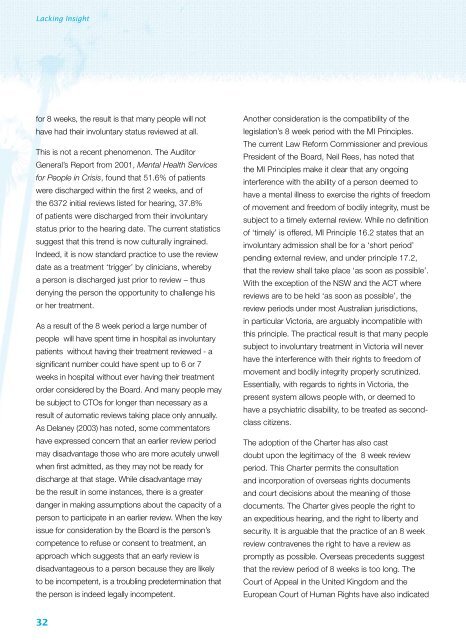Lacking Insight - Community Law
Lacking Insight - Community Law
Lacking Insight - Community Law
- No tags were found...
You also want an ePaper? Increase the reach of your titles
YUMPU automatically turns print PDFs into web optimized ePapers that Google loves.
<strong>Lacking</strong> <strong>Insight</strong>for 8 weeks, the result is that many people will nothave had their involuntary status reviewed at all.This is not a recent phenomenon. The AuditorGeneral’s Report from 2001, Mental Health Servicesfor People in Crisis, found that 51.6% of patientswere discharged within the first 2 weeks, and ofthe 6372 initial reviews listed for hearing, 37.8%of patients were discharged from their involuntarystatus prior to the hearing date. The current statisticssuggest that this trend is now culturally ingrained.Indeed, it is now standard practice to use the reviewdate as a treatment ‘trigger’ by clinicians, wherebya person is discharged just prior to review – thusdenying the person the opportunity to challenge hisor her treatment.As a result of the 8 week period a large number ofpeople will have spent time in hospital as involuntarypatients without having their treatment reviewed - asignificant number could have spent up to 6 or 7weeks in hospital without ever having their treatmentorder considered by the Board. And many people maybe subject to CTOs for longer than necessary as aresult of automatic reviews taking place only annually.As Delaney (2003) has noted, some commentatorshave expressed concern that an earlier review periodmay disadvantage those who are more acutely unwellwhen first admitted, as they may not be ready fordischarge at that stage. While disadvantage maybe the result in some instances, there is a greaterdanger in making assumptions about the capacity of aperson to participate in an earlier review. When the keyissue for consideration by the Board is the person’scompetence to refuse or consent to treatment, anapproach which suggests that an early review isdisadvantageous to a person because they are likelyto be incompetent, is a troubling predetermination thatthe person is indeed legally incompetent.Another consideration is the compatibility of thelegislation’s 8 week period with the MI Principles.The current <strong>Law</strong> Reform Commissioner and previousPresident of the Board, Neil Rees, has noted thatthe MI Principles make it clear that any ongoinginterference with the ability of a person deemed tohave a mental illness to exercise the rights of freedomof movement and freedom of bodily integrity, must besubject to a timely external review. While no definitionof ‘timely’ is offered, MI Principle 16.2 states that aninvoluntary admission shall be for a ‘short period’pending external review, and under principle 17.2,that the review shall take place ‘as soon as possible’.With the exception of the NSW and the ACT wherereviews are to be held ‘as soon as possible’, thereview periods under most Australian jurisdictions,in particular Victoria, are arguably incompatible withthis principle. The practical result is that many peoplesubject to involuntary treatment in Victoria will neverhave the interference with their rights to freedom ofmovement and bodily integrity properly scrutinized.Essentially, with regards to rights in Victoria, thepresent system allows people with, or deemed tohave a psychiatric disability, to be treated as secondclasscitizens.The adoption of the Charter has also castdoubt upon the legitimacy of the 8 week reviewperiod. This Charter permits the consultationand incorporation of overseas rights documentsand court decisions about the meaning of thosedocuments. The Charter gives people the right toan expeditious hearing, and the right to liberty andsecurity. It is arguable that the practice of an 8 weekreview contravenes the right to have a review aspromptly as possible. Overseas precedents suggestthat the review period of 8 weeks is too long. TheCourt of Appeal in the United Kingdom and theEuropean Court of Human Rights have also indicated32
















